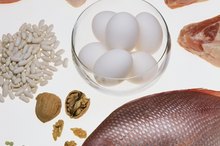Signs & Symptoms of Too Much Protein in the Diet
As an essential nutrient, dietary protein allows your body to perform critical tasks that it couldn’t do otherwise. Those tasks including building and repairing muscles, bones and organs; regulating hormones; and maintaining immune system function. However, it’s definitely possible to get too much protein, which can induce a variety of health problems.
How Much Is Too Much?
It can be tough to know for sure whether you’re getting too much protein, because the amount that’s right for you depends on factors such as your age, sex, weight and physical activity level. The Institute of Medicine recommends that adult women get 46 grams of protein per day and that adult men get 56 grams per day. Rice University suggests that if you weigh more and are more active, you may consume higher amounts and stay healthy. Aim for up to 0.6 to 0.9 grams per pound per day if you are a growing athlete or an adult building muscle mass.
- It can be tough to know for sure whether you’re getting too much protein, because the amount that’s right for you depends on factors such as your age, sex, weight and physical activity level.
- Rice University suggests that if you weigh more and are more active, you may consume higher amounts and stay healthy.
Weight Gain
What Is Protein Poisoning?
Learn More
If eating more protein than you need adds excess calories to your diet, it can mean unwanted weight gain over time. That may be especially true in Western countries, where high-fat, high-calorie and high-protein foods are dietary staples. The Physicians Committee for Responsible Medicine reports that most Americans get more than twice the amount of protein they need on a daily basis, for example, and the Centers for Disease Control and Prevention reports that almost 70 percent of adult Americans are overweight.
Nutrient Deficiencies
Focusing too heavily on one type of nutrient, such as protein, can mean you’re not getting enough other nutrients in your diet. A long-term high-protein diet may put you at increased risk of nutrient deficiencies. When you eat mainly protein-rich foods that come from animal products, you’ll be missing out on dietary fiber from plant proteins, and you may notice symptoms such as digestive problems, constipation or diverticulitis.
Severe Health Effects
Wheat Germ & Protein
Learn More
According to an article published in 2006 in the “International Journal of Sports Nutrition & Exercise Metabolism,” very high-protein diets, which can be defined as diets that advocate eating more than 200 grams of protein daily, raise the risk of certain conditions. These include hyperaminoacidemia, which is an excess of amino acids;, hyperammonemia, which results in an excess of ammonia; hyperinsulinemia nausea from an excess of insulin; and even early death. Some negative effects, including beginning hyperaminoacidemia and hyperammonemia, are observable after just one meal of 40 grams of protein or more, but those effects only become chronic and severe over time.
Related Articles
References
- Physicians Committee for Responsible Medicine: The Protein Myth
- Centers for Disease Control and Prevention: Obesity and Overweight
- International Journal of Sports Nutrition & Exercise Metabolism: A Review of Dietary Protein Intake in Humans
- University of Southern California: Meat and Cheese May Be As Bad As Smoking
- The American Journal of Clinical Nutrition: Myofibrillar Muscle Protein Synthesis Rates Subsequent to a Meal in Response to Increasing Doses of Whey Protein at Rest and After Resistance Exercise
- Fox News: Health Myth - You Can Never Have Too Much Protein
- None
- None
- None
- None
- None
- None
- None
- None
- None
- None
- None
- None
- None
- None
- None
- None
- None
- None
- None
- None
- None
- None
- None
- None
- None
- None
- None
- None
- None
- None
Writer Bio
Carly Schuna is a Wisconsin-based professional writer, editor and copy editor/proofreader. She has worked with hundreds of pieces of fiction, nonfiction, children's literature, feature stories and corporate content. Her expertise on food, cooking, nutrition and fitness information comes from a Level 1 personal training certification and years of in-depth study.









